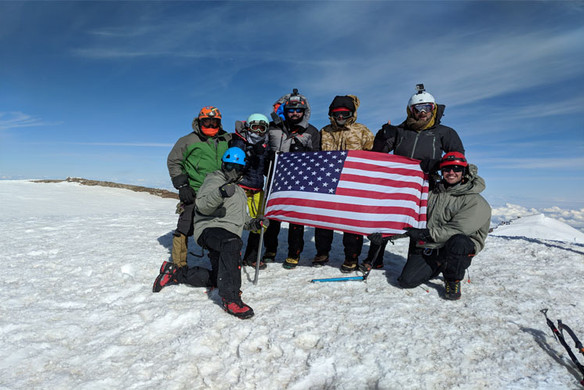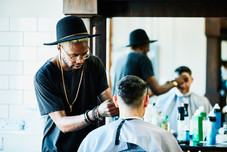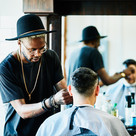When Justin Matejcek got into mountain biking, he rediscovered the spirit of teamwork that he felt while in the military. So Matejcek, who served in the Army from 2001 to 2006, founded Veterans Adventure Group. The nonprofit seeks to help other veterans regain a sense of community and to create an environment where they will thrive. A completely volunteer-run organization, it teams up veterans with other veterans in their community and trains them for extreme sports missions like mountain climbing, skydiving, and kiteboarding.
In honor of Veterans’ Day, Square team member Scott McBee (Army, 1981–1985) interviewed Square seller Matejcek to talk about Veterans Adventure Group, camaraderie, and serving the military community.
Scott: What did you love about the military?
Justin: I loved the teamwork and the purpose that you have in the military. I would argue the teamwork was the center of it all. It’s interesting, because you don’t get to pick your team in the military. You’re assigned this random group of guys, and it’s like, all right, you’ve got to figure out a way to make this happen. It creates an interesting dynamic that taught me a lot about how to work with people and teamwork in general.
How have you created esprit de corps, or camaraderie, amongst those who participate in Veterans Adventure Group?
I’d say extreme sports has been our ticket to building that camaraderie. You are putting these veterans back in environments where what they do matters, and they’re forced to rely on each other. They’re forced to have that trust again, just like they had in the military. That creates community, and community is really, I think, what all human beings really desire — having a good community you can relate with, where you feel at peace, where you don’t have to act in a way unnatural to who you really are. That’s what we want to do, and we want to help veterans thrive in that way.
I was in the Army and I really loved boot camp, but I don’t want to go through that again. Are any of your instructors drill sergeants?
A lot of our training is actually done through civilian companies that we hire to do the training for us. Some of the training is pretty intense. Like, with mountaineering, we teach you how to do all the self-arrest drills and crevasse rescue. We’re not going to get in your face like a drill sergeant, but we are going to make sure you’re able to accomplish this stuff. At the end of the day the main goal is to all have fun.
You’ve noted before that you are not a therapeutic organization, but there’s some healing happening. How do you talk about the work you do?
I would argue that veterans are viewed as liabilities to society. People feel that they have to take care of us. I don’t want people to feel sorry for me for serving. I don’t want people to apologize for the fact that I went overseas. I don’t want people to apologize for the experiences I’ve had. I volunteered in war time knowing what I was getting into, and that’s something I take a lot of pride in, and when people start to apologize for that it takes away that pride that you have.
We talk about our company as serving veterans. A lot of nonprofits are very reactive. They are dealing with veterans after they’ve been suicidal, after they’ve been homeless, or after they’re having these drug addiction problems. They’re trying to give them hope. I look at it as, why not be proactive? Why not try to do things that prevent them from ever getting there in the first place?
I’ve had veterans come to us and be like, “Oh man, what you guys do sounds awesome. I wish I could be part of it, but I’m not wounded, so I don’t have a place in that.” I’m like, “No man, you don’t have to be wounded, you don’t have to have PTSD, we just want to work with you because you’re a veteran. We want to give you back the community you had in the military.”
Who participates in Veterans Adventure Group?
Most of people in leadership are veterans but we ensure we have at least one civilian on our board. It helps us avoid the group-think.
On the demographics for male and female, we actually have a lot of women that participate in our programs. We do have a few female team leaders as well. One of our female leaders is a single-leg amputee who does the training at our kiteboarding events. She’s amazing. She’s a sponsored kiteboarder by Cabrinha Kites, she’s a world-class kiteboarder and she’s awesome. We are honored to have her on our team with us. We had pretty much had a female in every group, if not more than one.
As far as race goes, we have veterans from all different races who are participating in what we’re doing. We do try to cater toward the military demographic.
Do you work with other organizations that serve veterans?
Yeah. We are very well networked with many other nonprofits doing similar work. Nonprofits, as you know, have to function like a regular business, too. We have competition and we have to make sure we try to work properly with other veteran nonprofits that are doing similar stuff to us. At the end of the day, rather than trying to do everything so-so, we’d rather do one thing very well.
What we do very well is extreme sports; what we do not do very well is, say, financial assistance, or medical issues, or stuff with the VA, all that disability stuff. That’s not our specialty. But if we have a veteran who needs that, we can send them a direct contact. If an organization gets veterans who want to get into outdoor sports, they’ll send them our way. We’ve created this really good network to get veterans get whatever they need.
You receive equipment from sponsors. Do they realize what good deeds they’re doing, and how they’re helping those who have served?
They definitely do. We try to invite someone from the company, or whoever made the donation possible, out on our trips so they can see firsthand who’s using the equipment. They meet these guys, hear their stories, and see how this gear was fundamental in accomplishing this mission.
There is a direct sense of pride those donors can take, knowing that we probably would not be able to do this without their donation. We’d be putting veterans in a very dangerous situation if it weren’t for their donations. We’re extremely grateful for it. Being a very small nonprofit, we’re truly grateful for every donation regardless of how large or small it is, because all that little stuff adds up to make a huge impact.
![]()











